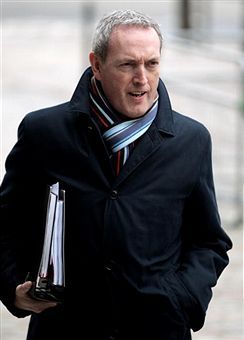 As expected, John Hutton’s review of public sector pensions has recommended that
final salary schemes end. Hutton was across the broadcasters this morning, explaining that he was reflecting an “inescapable reality”:
As expected, John Hutton’s review of public sector pensions has recommended that
final salary schemes end. Hutton was across the broadcasters this morning, explaining that he was reflecting an “inescapable reality”:
“The solution to this problem is not a race to the bottom, it’s not to hack away at the value of public service pensions. It’s to manage the risks and costs sensibly. The responsible thing to do is to accept that because we are living longer we should work for longer.”
Beside realism, Hutton’s guiding principle has been fairness. Final salary schemes encourage a “massive cross-subsidy from low-paid public servants to high-paid public servants” to pay for the “sudden spike” in pay at the end of a career. Hutton is “deeply troubled” by a policy that forces younger generations of public sector workers to “shoulder the cost and burden change”. Therefore, pensions should be determined by career average earnings.
At the moment, opposition to Hutton is split. Dave Prentis, the General Secretary of Unison, shied from attacking Hutton. Instead, he condemned the government’s decision to increase contributions at a time of “massive increases in the cost of living and pay freezes.” On the other hand, Mark Serwotka, the General Secretary of the Public and Commercial Services Union, nonchalantly promised that “strikes are inevitable”, which places him among the ranks of the militant with Len McCluskey and Bob Crow. Christine Blower, General Secretary of the NUT, was adamant that “public sector pensions are not ‘gold plated’ and they are affordable.” The threat of a general strike across the public sector is now more serious; not least because its pensions are protected by complicated legal contracts. This will be an arduous struggle.
At the time of writing, the Labour Party has yet to respond. Many on its benches will empathise with their former colleague. Liam Byrne, shadow welfare and pensions secretary, is one of those whose centrist instincts probably recognise the need for reform. But repression may trump expression. The public sector is Labour’s heart and soul; these are their people. The party’s financial dependence on the unions is also a complicating factor, which may force the Miliband’s hand. Labour may also want to strengthen its emerging line about the cost of living: ‘is this the time to squeeze disposable income still further?’ it may ask. However, siding with Crow et al comes with a political health warning in technicolour. It will be fascinating to see which way Labour jumps.
UPDATE: Shadow chief secretary Angela Eagle has made Labour’s initial response. She was tentative. On the one hand she said that Hutton “offers a good way forward”; but on the other she condemned the government’s proposed contributions increase on the grounds that it was wrong “to take value out of public sector pensions now to close the deficit”. The rising cost of living is becoming Labour’s key attack line and I suspect Liam Byrne to rhapsodise Eagle’s theme later today. The militant unions look like being isolated, but that does not lessen the threat of a general public sector strike.






Comments